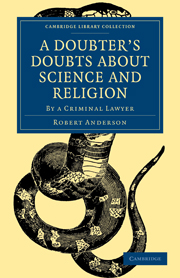Summary
Is Christianity a Divine revelation? This question must not be settled by the result of the preliminary inquiry here proposed. In rejecting sacerdotalism as a degrading medieval superstition, we merely clear the ground for a discussion of the main question upon its merits. “The Reformation,” says Mr. Goldwin Smith, “was a tremendous earthquake” which “shook down the fabric of medieval religion.” “But,” he goes on to say, “it left the authority of the Bible unshaken, and men might feel that the destructive process had its limit, and that adamant was still beneath their feet.”
To the Bible, then, we turn. But how is such an inquiry to be conducted? The unfairness of entrusting the defence of Christianity to any who are themselves the rejecters of Christianity will be palpable to every one. Here the right of audience is only to the Christian. But, in making this concession, the sceptic may fairly insist on maintaining the place of critic, if not of censor. Until convinced, he will continue to consider, reflect, hesitate, doubt.
And it is a suspicious circumstance that so many who claim to be leaders of religious thought, and who are professional exponents of the Christian faith, seem eager not only to eliminate from Christianity everything that is distinctive, but also to divorce it from much with which, in its origin, it was inseparably associated. They are strangely anxious to separate it from the Judaism which it succeeded, and upon which it is so indisputably founded.
- Type
- Chapter
- Information
- A Doubter's Doubts about Science and ReligionBy a Criminal Lawyer, pp. 66 - 78Publisher: Cambridge University PressPrint publication year: 2009First published in: 1889

